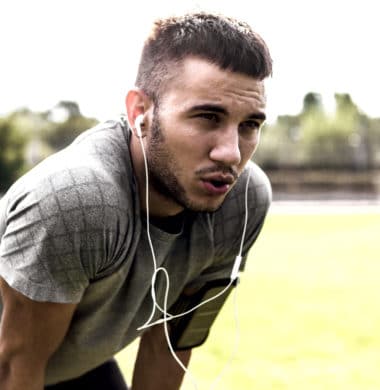Staying Cool When Exercising in the Heat

Keeping fit is important for your heart health. If you are trying to maintain a healthy heart, you likely want to exercise year-round. However, now that we’re in the midst of summer, the heat can make your workout routine dangerous. If you have had heart disease or have heart disease risk factors, you need to be careful when exercising in hot conditions.
How Heat Stresses Your Heart
When your body tries to get rid of heat, it reroutes some of your blood to the skin. This is why you look flushed in the heat. To achieve this extra blood circulation, your heart might pump twice or four times as hard on a hot day as on a cooler day. Obviously, when you add a heavy exercise routine on top of that, you are putting serious stress on your heart.
Another problem is that working out in the heat makes you sweat to cool down. While you’re sweating, you lose not only water but also vital nutrients that help regulate your heart and other muscles. Your body might try to hold on to these nutrients by using hormones that can reduce your ability to sweat. This can make you more likely to overheat.
People with heart disease may suffer even more stress because of their condition. If you’ve had a heart attack or other damage to your heart, it might not be able to pump hard enough to keep up with cooling and exercise demands.
In addition, arterial plaque can clog capillaries (small blood vessels near the skin) as well as your larger blood vessels. This keeps blood circulation from effectively cooling your body.
Some medications can also interfere with your body’s ability to deal with the heat. Beta-blockers slow your heart, making it harder to keep up with cooling and exercise demands. Some medications may reduce your ability to sweat. In addition, some medications may make you lose more moisture, leading to dehydration.
Some conditions may keep your body from noticing dehydration effects until it’s too late.
Tips for Keeping Cool When Exercising in the Heat

Avoid the Heat: Of course, one great strategy for staying cool is avoiding exercise during the heat of the day. Try exercising during the right time of the day or choosing a cool place to exercise, such as an air-conditioned gym. Ensure portland air conditioning maintenance are done so the ACs work their best. If you’re in need of professional ac repair Roanoke services, you may contact local companies like Blue Ridge Hearing & Air. Regular maintenance will help you avoid the AC unit dripping water.
Take Cooling Breaks: If you are exercising in the heat, take periodic breaks to let yourself cool down. Get out of the heat if you can. Otherwise, cool yourself off with a splash of cool water, a wet towel on your neck, or even a cold shower.
Dress for the Heat: Make sure you choose light, loose clothing for exercising in hot weather. This helps your body lose heat more efficiently.
Choose Cooling Exercises: Some exercises help your body cool more effectively. Bicycling, for example, allows you to move faster, increasing the amount of heat your body can shed. Water cools your body more quickly than air, so swimming and other exercises in the pool can help you stay cool. Exercising near water can also help you avoid the heat, as the temperature may be lower near large bodies of water.
Anticipate Fluid Loss: Don’t wait for signs of dehydration before you start drinking. Hydrate before, during, and after exercise. Drinking straight water is the easiest way to replenish fluids, but replenish lost nutrients with a sports drink for long and intense sessions.
Know the Signs of Heat Illness: It’s important to know when you’re suffering from heat illness. If you start to experience:
- Fatigue
- Nausea or vomiting
- Racing heart (tachycardia)
- Headache
- Disorientation
- Muscle twitches or cramps
Get to a cool place and drink cool water. If symptoms don’t improve, get medical help. It’s a good idea to exercise with a partner so you can watch for problems in each other.
How South Denver Cardiology Associates Can Help
At South Denver Cardiology Associates, we are dedicated to an interdisciplinary approach to heart health. This includes support for a healthy lifestyle. We can help you understand your risks and limitations so that you can safely maximize your potential. We sponsor exercise events designed to help people with heart problems get healthier. We even have exercise facilities that let you get the workout your heart needs in cool, safe conditions.
Want to learn more about how we can help you get and stay healthy? Please call 303-744-1065 or use our online form to request an appointment at our main office in Littleton or one of our other locations.
- Common Treatments for Peripheral Vascular Disease - April 23, 2025
- Are Ultra-Processed Foods Bad for Your Heart Health? - April 14, 2025
- What Do Heart Palpitations Feel Like? - April 14, 2025
Sign Up
As with any health concerns, your specific treatment program should be discussed thoroughly with your primary care physician as well as any specialists who may need to be consulted – like a cardiologist.
Sign Up
